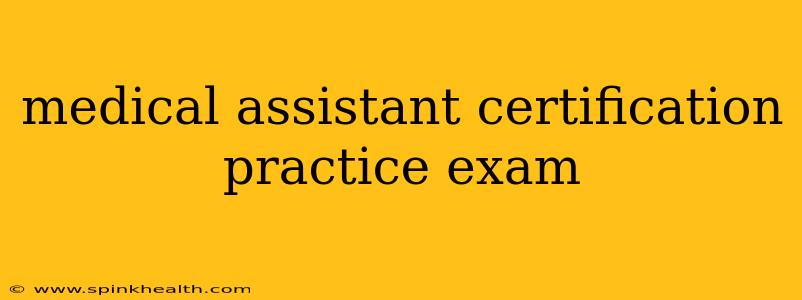Ace Your Medical Assistant Certification: A Practice Exam Deep Dive
So, you're ready to conquer your medical assistant certification exam? The anticipation is real, the pressure is on, but with the right preparation, you can absolutely nail it. This isn't just another practice exam; it's a journey through the key concepts, a chance to solidify your knowledge, and a roadmap to success. Think of this as your personalized study buddy, guiding you through the most crucial areas. Let's begin!
What are the different types of medical assistant certifications?
This is a fundamental question, and understanding the landscape of certifications is crucial. The most widely recognized certifications are offered by the American Association of Medical Assistants (AAMA) – the Registered Medical Assistant (RMA) – and the American Medical Technologists (AMT) – the Certified Medical Assistant (CMA). Each certification has its own examination process and requirements, highlighting the importance of knowing which path you’re pursuing. Choosing the right certification often depends on your state’s requirements and the specific career goals you have in mind. Researching the specific requirements for your state is vital before sitting for any exam.
How long does it take to prepare for the medical assistant certification exam?
The time needed to prepare varies greatly depending on your existing medical knowledge, learning style, and study habits. Some individuals might prepare adequately in a few weeks, while others require several months. A consistent study schedule, focusing on your weaker areas, is key. Don’t just cram; understand the concepts. Create a study plan that breaks down the material into manageable chunks, incorporating practice questions and simulated exams to gauge your progress. Remember, it’s quality over quantity when it comes to study time.
What topics are typically covered on the medical assistant certification exam?
The exam tests a broad range of knowledge crucial for medical assistants. Expect questions covering administrative tasks like scheduling appointments, managing medical records, and insurance processing. The clinical side includes vital signs measurement, phlebotomy, electrocardiography (ECG), assisting with examinations, and understanding basic medical terminology. Understanding medical law and ethics is also vital and consistently features on these exams. Knowing the scope of practice for a medical assistant is particularly important as it forms the basis for many exam questions.
What are some common mistakes to avoid when taking the medical assistant certification exam?
One common mistake is underestimating the importance of time management. Practice taking practice tests under timed conditions to get used to the pace. Another is focusing solely on memorization without understanding the underlying concepts. Truly grasping the "why" behind the procedures is far more effective than rote learning. Don't rush through questions; carefully read each question and all the options before selecting your answer. And finally, neglecting to review your weak areas. Identify your problem areas early on and focus your study time accordingly.
Are there any resources available to help me prepare for the medical assistant certification exam?
Absolutely! Numerous resources can help you prepare. Textbooks specifically designed for medical assistant certification are readily available. Online courses and practice exams offer a convenient and flexible way to learn and test your knowledge. Many community colleges and vocational schools offer comprehensive preparation programs. Don't hesitate to utilize all available resources—the more you practice, the more confident you'll become. Reviewing past exams and quizzes can also help you identify patterns and common question types.
How can I improve my chances of passing the medical assistant certification exam on the first try?
Passing on the first attempt is definitely achievable with dedicated effort and a smart study strategy. Start early, create a realistic study plan, utilize diverse study materials, and practice consistently. Identify your strengths and weaknesses and focus your study time on the areas where you need improvement. Simulate exam conditions by taking practice tests under timed conditions. Remember, confidence plays a crucial role, so stay positive and believe in your abilities.
This journey to certification isn't just about passing an exam; it’s about building a solid foundation for your career. Remember to stay focused, stay positive, and you'll be well on your way to becoming a certified medical assistant! Good luck!

